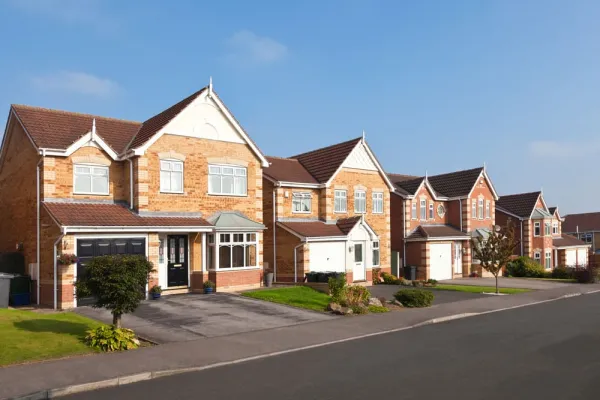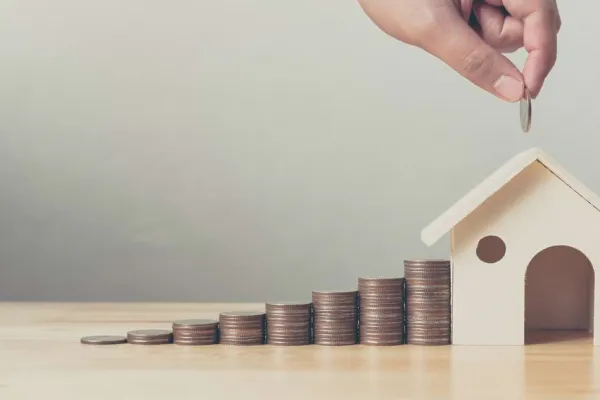If you’re buying or selling a property, you may have encountered the term ‘no onward chain’.
But what does it mean? And are there benefits to it?
Our guide explains all.
What is a property chain?
Most property sales in the UK will be part of a chain.
When a property is part of a chain it means that the sale of a property relies on another sale being completed.
So, the owner of house one will use the proceeds of their sale to buy house two. And the owner of house two will then use the sale proceeds to buy house three.
This keeps going until there is a property sale with no onward chain.
If any of these sales in the chain fall through, the chain breaks. And no one will complete their sale.
What does no onward chain mean?
When there is ‘no onward chain’, it means that the person selling the property isn’t buying another property with the funds from the sale.
So, the house is ready to be sold straight away. This is because the seller already has another place to move into or live.
Reasons a property has no onward chain
1. The property is inherited
It’ll have no onward chain when you inherit a house from someone who passes away.
This is because the seller is not dependent on selling it to move somewhere else. It’s an uninhabited house.
2. The property was rented to tenants
When you sell a tenanted property, it often has no onward chain. The landlord will have another place to live.
And they can thus take their time to complete the sale.
3. The seller is moving to rented accommodation
This puts a roof over the head of the seller, independent of the transaction.
This may only be a short-term solution, for a year or two. But in the meantime, they can take their time selling the house.
4. The seller is moving to another property that has already been bought
This is achievable for people with lots of money.
They have the funds to buy another house without depending on the sale money from their existing home.
This is an extraordinary position to be in. And it gives lots of flexibility.
What’s the difference between no onward chain and no chain?
When a property has no onward chain, the chain will end with that sale.
When the buyer is chain-free, it means that they are not purchasing the new property with proceeds from the sale of their home.
So, first-time buyers will have no chain, as they are not reliant on a property sale going through to be able to buy their first home.
When a buyer has no chain, their purchase will sometimes be the beginning of a property chain. By contrast, no onward chain will end a property chain.
Reasons no onward chain can collapse
Sales process is delayed – causing frustration
If your house sale takes a long time, people may get frustrated. Someone could be labelled a ‘timewaster’.
Or perhaps one of the parties is on a tight schedule. This may result in them walking away.
The buyer can’t secure a mortgage
It’s not always the seller that causes a house transaction to fall apart.
The whole thing can collapse if the buyer struggles to gather their funds. Failing to secure a mortgage is a common example.
The buyer or the seller change their mind
Anyone can change their mind before the exchange of contracts. Perhaps your financial or personal circumstances have changed.
So, while the transaction once seemed attractive, it doesn’t anymore.
One of the preceding sales in the chain falls through
Even when you don’t have an ‘onward chain’, there could still be a chain beneath you.
If this falls apart, it can disrupt your buyer, as their own house sale falls apart. This could take away the funds they need to buy yours.
The survey highlights structural issues with the property
It’s always recommended that you be honest about the condition of your house.
If a buyer pays for a survey, and the results are bad, it could be a ‘dealbreaker’, especially if you aren’t willing to renegotiate the price.
Gazundering
Gazundering means that your buyer reduces their offer at the last minute. If you’re unwilling to accept this, it may feel better to walk away.
A lack of flexibility and compromise from both parties may collapse the deal.
What are the benefits of having no onward chain?
You can unlock several advantages during a transaction with no onward chain.
This makes it attractive to buyers. The main benefits are listed below.
Faster
Your seller isn’t waiting around for other people to ‘get their act together’.
They’re ready to sell immediately. So, if you move fast, then so can they. These house sales often get done much quicker.
Less risky
There are fewer moving parts in a house with no onward chain.
You aren’t impacted by a long ongoing chain where many people can make mistakes.
Instead, your likelihood of completing is much higher. And buyers find this attractive.
















